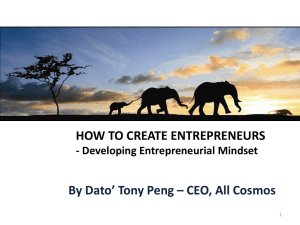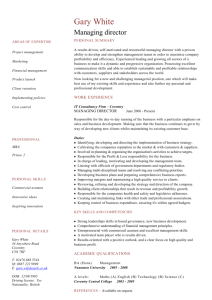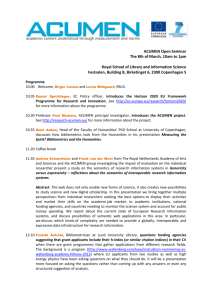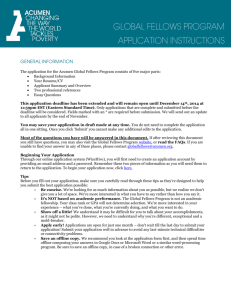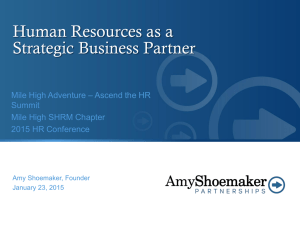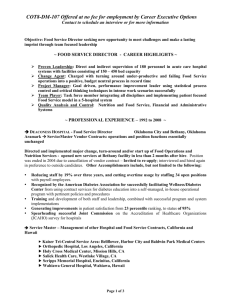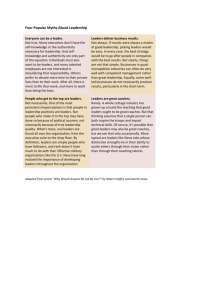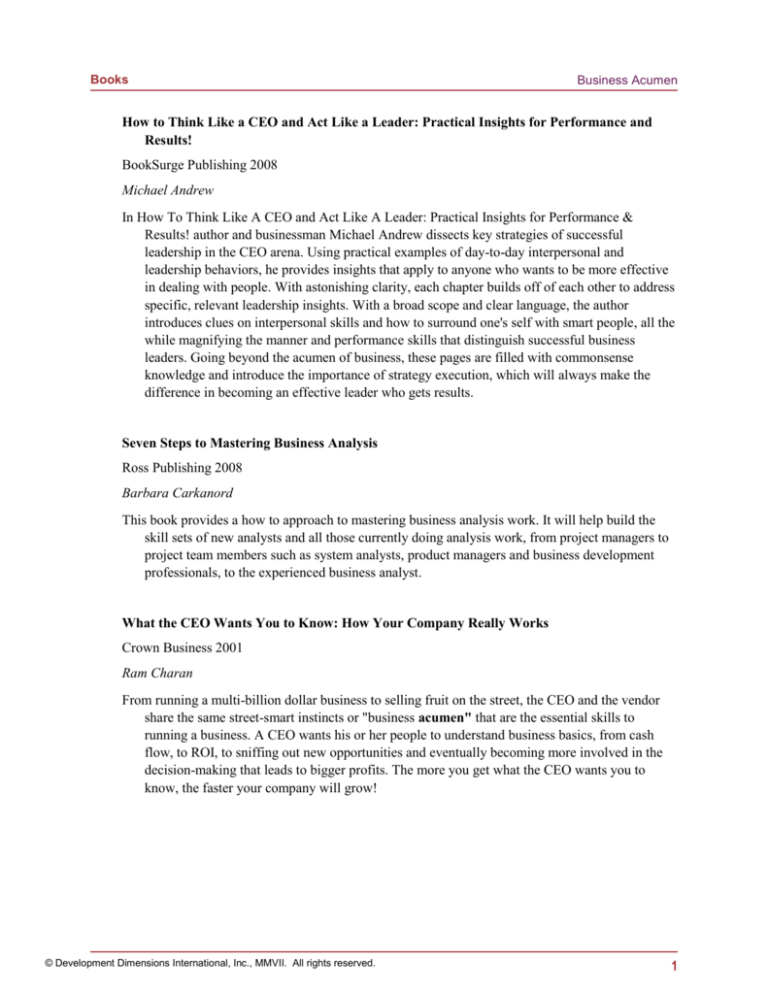
Books
Business Acumen
How to Think Like a CEO and Act Like a Leader: Practical Insights for Performance and
Results!
BookSurge Publishing 2008
Michael Andrew
In How To Think Like A CEO and Act Like A Leader: Practical Insights for Performance &
Results! author and businessman Michael Andrew dissects key strategies of successful
leadership in the CEO arena. Using practical examples of day-to-day interpersonal and
leadership behaviors, he provides insights that apply to anyone who wants to be more effective
in dealing with people. With astonishing clarity, each chapter builds off of each other to address
specific, relevant leadership insights. With a broad scope and clear language, the author
introduces clues on interpersonal skills and how to surround one's self with smart people, all the
while magnifying the manner and performance skills that distinguish successful business
leaders. Going beyond the acumen of business, these pages are filled with commonsense
knowledge and introduce the importance of strategy execution, which will always make the
difference in becoming an effective leader who gets results.
Seven Steps to Mastering Business Analysis
Ross Publishing 2008
Barbara Carkanord
This book provides a how to approach to mastering business analysis work. It will help build the
skill sets of new analysts and all those currently doing analysis work, from project managers to
project team members such as system analysts, product managers and business development
professionals, to the experienced business analyst.
What the CEO Wants You to Know: How Your Company Really Works
Crown Business 2001
Ram Charan
From running a multi-billion dollar business to selling fruit on the street, the CEO and the vendor
share the same street-smart instincts or "business acumen" that are the essential skills to
running a business. A CEO wants his or her people to understand business basics, from cash
flow, to ROI, to sniffing out new opportunities and eventually becoming more involved in the
decision-making that leads to bigger profits. The more you get what the CEO wants you to
know, the faster your company will grow!
© Development Dimensions International, Inc., MMVII. All rights reserved.
1
Books
Business Acumen
Articles:
Building Better Business Acumen
Chief Learning Officer
Ted E. Prince
Aug2010, Vol. 9 Issue 8, p40-43
This article discusses the importance of business acumen in developing leadership qualities and
how chief learning officers can help a company's staff develop better business acumen. The
article notes that business acumen is the capability of bringing about positive business
outcomes. The article describes the desired outcomes of a business acumen program and
presents approaches to its development.
Do Your People Get It?
Human Resources Magazine
Susan Ockwell
Dec2009/Jan2010, Vol. 14 Issue 5, p28-29
The article discusses the importance of business acumen (BQ) to the organizational process. BQ
means the understanding of the impact of one's daily action and decisions on the success of the
organization. Human resource (HR) professionals can develop BQ in their employees by
providing focuses training, creating an open session where the chief executive officer (CEO) or
the chief financial officer (CFO) can discuss the results of an annual report, and developing a
BQ education program where different aspects of the organization will be addressed.
Finance as a Business Partner: the Importance of Business Acumen Training for
Managers and Employees
Accountancy Ireland
Rory Coll and Raymond Green
Dec2008, Vol. 40 Issue 6, p58-61
© Development Dimensions International, Inc., MMVII. All rights reserved.
2
Books
Business Acumen
The article discusses the importance of business acumen training for managers and employees. As
managers and employees have a narrow focus limited to their own departments and functions
resulting for not always aligned with broader business objectives, many companies around the
world are implementing training in financial literacy and business acumen to help address the
problem.
Know Your Business
People Management
Stephanie Bird
May2011, p7
The article discusses characteristics that contribute to being effective in a company's human
resources (HR) department and to proving an individual would make a good non-executive
director. A survey shows that firms looking to recruit non-executives prefer those who have
robust personalities with a strong business acumen. The ability of being able to work at the
intersection of organizational, business and contextual areas is described as a vital part of
developing an insight-led profession in HR.
Leadership Potential
Leadership Excellence
Ram Charan
Sep2008, Vol. 25 Issue 9, p18
The article discusses how leaders can recognize leadership potential. One way to think about the
talent of a leader is to think of the people acumen and the business acumen. On people
acumen, leadership is predicated on the ability of the person to mobilize others to accomplish a
task. Also, a person is said to have a business acumen if he understands how the business
makes money by managing the profit and loss (P&L), and balance sheet. To spot a leader, look
for actions, decisions, and behaviors that reveal their potential as leaders.
Leveraging Business Acumen for Utility Success
Management Quarterly
Fred Jennings
Fall2009, Vol. 50 Issue 3, p2-11
The article discusses how utilities can instill business acumen, or the ability to make smart
business judgments, and implement a long-term capital optimization program. It describes the
integration of business acumen into the process for evaluating and deploying capital
© Development Dimensions International, Inc., MMVII. All rights reserved.
3
Books
Business Acumen
investment and explains the capital optimization process. The limitations of the various
prioritization schemes and asset management techniques usually applied by utilities are also
highlighted.
Strength in Recession
Leadership Excellence
Ted E. Prince
Apr2009, Vol. 26 Issue 4, p8-9
The article discusses the link between leadership cycle and economic cycle. Leadership behaviors
impact the economic cycle. The two basic approaches in leadership are interpersonal skills
approach and business acumen approach. The leadership cycle refers to the interplay between
these approaches and to the economic impact of one approach or the other assuming primacy at
different phases of economic cycle. The four phases of the economic cycle are booms, busts,
corrections, and recoveries.
What's Not to Love?
Newsweek
Barton Biggs
4/26/2010, Vol. 155 Issue 17, p8
The author opines on European business acumen and the emergence of Europe from the global
financial crisis. The author indicates that Europe's top companies have been more profitable
than those in Japan and the U.S. during the last 10 years. The author presents economic
forecasting data for the U.S., Germany, and Europe.
Charan, R. (2001). What the CEO wants you to know: How your company really works. New
York: Crown Business.
Collins, J.C. (2001). Good to great: Why some companies make the leap...and others don’t. New
York: HarperCollins.
Collins, J.C., & Porras, J.I. (1994). Built to last: Successful habits of visionary companies. New
York: HarperCollins.
Gill, J.O., & Chatton, M. (2001). Financial analysis: The next step. (Rev. ed.). Menlo Park, CA:
Crisp Publications.
Harvard business essentials guide to finance for managers. (2002). Boston: Harvard Business
School Press.
Heerkens, G. (2006). The business-savvy project manager: Indispensable knowledge and skills for
success. New York: McGraw-Hill.
© Development Dimensions International, Inc., MMVII. All rights reserved.
4
Books
Business Acumen
Herrmann, K.R. (2001). Visualizing your business: Let graphics tell the story. New York: John
Wiley & Sons.
Jablonsky, S.F., & Barsky, N.P. (2001). The manager’s guide to financial statement analysis. New
York: John Wiley & Sons.
Kremer, C., Rizzuto, R., & Case, J. (2000). Managing by the numbers: A commonsense guide to
understanding and using your company’s financials. Cambridge, MA: Perseus.
Norton, G.M. (2002). Valuation: Maximizing corporate value. New York: John Wiley & Sons.
Slywotzky, A.J. (2002). The art of profitability. New York: Warner Business.
Vance, D.E. (2002). Financial analysis and decision making: Tools and techniques to solve
financial problems and make effective business decisions. New York: McGraw-Hill.
© Development Dimensions International, Inc., MMVII. All rights reserved.
5

